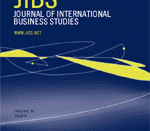The concept of trust has been examined in a wide variety of organizational and social settings, and accordingly conceptualized in different ways see (Hosmer 1995 for a review). For instance, trust in interpersonal relations is defined as the willingness of one person to increase his/her vulnerability to the actions of another person (e.g., Zand 1972); in economic exchanges as the expectation that parties will make a good faith effort to behave in accordance with any commitments, be honest in negotiations, and not take advantage of the other, even when the opportunity is available (Hosmer 1995); and in society as a collective attribute based upon the relationships in a social system (Lewis and Weigert 1985). A review of the literature examining trust points towards two issues relevant to this study. First, although trust, with its property of bilateral expectations of behavior, exists between individuals, it can be extended to exchanges between organizations because interorganizational relationships are managed by individuals in each organization (e.g.,
Bradach and Eccles [1989); Hosmer 1995). Thus, as suggested by Madhok (1995) and Thorelli (1986), trust in inter-firm relationships includes a set of expectations between the partners regarding each other's behavior and each partner's fulfillment of its perceived obligations in light of such anticipation. Second, the literature suggests that the "expectations of behavior" between exchange partners has two components: structural and behavioral (Hosmer 1995; Madhok 1995). The structural component refers to the form of trust fostered by mutual hostages and complementarity of resources contributed by the partners (Madhok 1995). As suggested by Madhok (1995), the structural dimension may be essential for the creation of the relationship but not sufficient for its continuation, because one partner may become more vulnerable in the relationship because of unequal dependence.
The behavioral component of trust refers to the confidence aspect in exchange...


